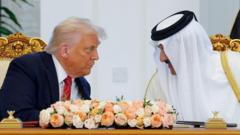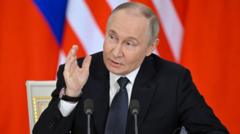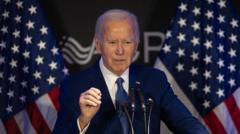**The interaction, once unthinkable, indicates potential shifts in U.S.-Syria relations as the Syrian population yearns for change amidst ongoing struggles.**
**New Horizons for Syria: Trump and Sharaa Forge Unlikely Alliance**

**New Horizons for Syria: Trump and Sharaa Forge Unlikely Alliance**
**A pivotal meeting between Donald Trump and Syria's interim leader sparks renewed optimism among Syrians.**
In a historic turn of events, former President Donald Trump and Syria's interim President Ahmed al-Sharaa convened in Riyadh on Wednesday, marking a significant shift in diplomatic dynamics that many thought impossible only a few months ago. Following their 37-minute meeting, Trump expressed optimism about the potential for normalizing relations with Syria, a country long beset by civil war and suffering.
The backdrop for this extraordinary encounter was a lavish Saudi royal palace. Notably, a beaming Saudi Crown Prince, Mohammad bin Salman, was present, alongside Turkish President Recep Tayyip Erdogan, who joined the meeting via telephone. Trump's words, declaring Sharaa’s potential, carried weight, especially given Sharaa's past associations with Al-Qaeda, from which he distanced himself in 2016.
Despite recently lifting a $10 million bounty on Sharaa's head, the U.S. decision to reconsider its sanctions on Syria was met with applause at a U.S.-Saudi investment forum. This change in tone from Trump represents a pivot from previous assertions of having “no interest in Syria.” Acknowledging the influence of regional leaders in this diplomatic shift, Trump’s announcement has ignited hope within a country where poverty is rampant.
Syrians, reeling from over a decade of conflict, celebrated the potential for relief from sanctions that have crippled their economy. Activists, like Hind Kabawat, have been advocating for such changes, emphasizing the dire need for aid to reach the people of Syria.
With the backdrop of widespread destitution, discussions surrounding sanctions relief could prompt many expatriated Syrians to reconsider returning to their homeland. The allure of international aid and investment might also support a struggling interim government in addressing daily hardships while striving towards reconstruction.
However, lifting the multitude of sanctions will prove complex, and experts, including Dina Esfandiary of Bloomberg Economics, suggest that while some sanctions could be swiftly ameliorated, substantial changes will require deep commitment from the U.S. administration.
Encouragingly, Sharaa's leadership signals a willingness to engage in constructive relationships, especially with Israel, as he indicated a readiness to join the Abraham Accords if conditions are favorable. Trump's interest in furthering this dialogue also hinges on dismantling foreign militant presences within Syria, a demand that remains a significant hurdle in the normalization process.
Trump hailed the meeting as a "chance at greatness," while the suffering Syrian populace is left hoping for substantial changes in their lives. With regional players keenly observing the evolving situation in Syria, the road ahead promises challenges as well as the potential for an improved future for millions.
The backdrop for this extraordinary encounter was a lavish Saudi royal palace. Notably, a beaming Saudi Crown Prince, Mohammad bin Salman, was present, alongside Turkish President Recep Tayyip Erdogan, who joined the meeting via telephone. Trump's words, declaring Sharaa’s potential, carried weight, especially given Sharaa's past associations with Al-Qaeda, from which he distanced himself in 2016.
Despite recently lifting a $10 million bounty on Sharaa's head, the U.S. decision to reconsider its sanctions on Syria was met with applause at a U.S.-Saudi investment forum. This change in tone from Trump represents a pivot from previous assertions of having “no interest in Syria.” Acknowledging the influence of regional leaders in this diplomatic shift, Trump’s announcement has ignited hope within a country where poverty is rampant.
Syrians, reeling from over a decade of conflict, celebrated the potential for relief from sanctions that have crippled their economy. Activists, like Hind Kabawat, have been advocating for such changes, emphasizing the dire need for aid to reach the people of Syria.
With the backdrop of widespread destitution, discussions surrounding sanctions relief could prompt many expatriated Syrians to reconsider returning to their homeland. The allure of international aid and investment might also support a struggling interim government in addressing daily hardships while striving towards reconstruction.
However, lifting the multitude of sanctions will prove complex, and experts, including Dina Esfandiary of Bloomberg Economics, suggest that while some sanctions could be swiftly ameliorated, substantial changes will require deep commitment from the U.S. administration.
Encouragingly, Sharaa's leadership signals a willingness to engage in constructive relationships, especially with Israel, as he indicated a readiness to join the Abraham Accords if conditions are favorable. Trump's interest in furthering this dialogue also hinges on dismantling foreign militant presences within Syria, a demand that remains a significant hurdle in the normalization process.
Trump hailed the meeting as a "chance at greatness," while the suffering Syrian populace is left hoping for substantial changes in their lives. With regional players keenly observing the evolving situation in Syria, the road ahead promises challenges as well as the potential for an improved future for millions.






















